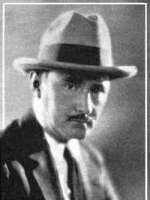Max Miller est un Acteur et Auteur Britannique né le 21 novembre 1894 à Brighton (Royaume-uni)
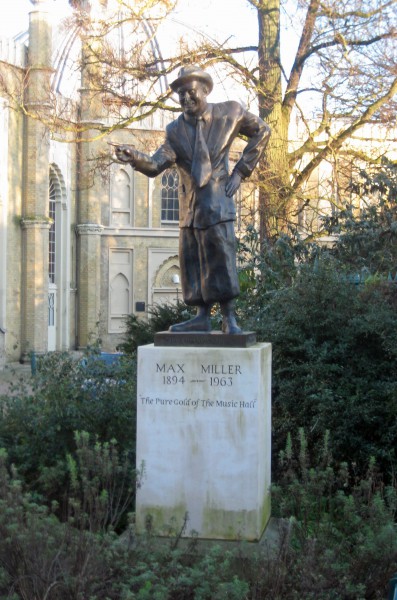
Thomas Henry Sargent (21 November 1894 – 7 May 1963), best known by his stage name Max Miller and also known as 'The Cheeky Chappie', was a British comedian who was widely regarded as the greatest stand-up comedian of his generation. He made films, toured in revues and music hall, and sang and recorded songs, some of which he wrote. He was known for his flamboyant suits, his wicked charm, and his risqué jokes which often got him into trouble with the censors.
Miller was born as Thomas Henry Sargent on 21 November 1894 in Hereford Street, Kemptown, Brighton, Sussex. He was the second child of James Sargent, a labourer and Alice (née West), a flower seller; Miller had three brothers and two sisters. His parents were poor and often unable to pay rent so were forced to move to other parts of the town. Owing to this, Miller frequently changing schools until he reached 12, when he left altogether. He tried various jobs, labouring, delivering milk, selling fish and chips, caddying at the Brighton and Hove Golf Course and finally trained to be a motor mechanic. As a youth he was nicknamed "Swanky Sargent".
On the outbreak of war in 1914, Miller volunteered for the army. He joined the Royal Sussex Regiment and, after serving in France, was posted to India and a year later to Mesopotamia, where he was temporarily blinded for three days. This experience stayed with him all his life, and in later years he did much work to help the blind. During his time in the army, he started a troops’ concert party.
Start of career in show business
Demobilized from the army, he found work to be in short supply. He had lost his mother to the 1918 flu pandemic. He had his sights on performing in London and obtained a booking in the Shoreditch Hall in 1919. He was not experienced enough for the type of venue and lasted only a week. Returning to Brighton he saw an advertisement for artists to join Jack Sheppard’s concert party in an alfresco theatre on Brighton beach. He applied and joined as a light comedian for the 1919 summer season. While with the concert party, he met his wife Frances Kathleen Marsh, who was a contralto in the group.
Kathleen Marsh came from a middle class family whose parents came to Brighton from Dorset shortly before she was born in 1896. Her elder brother Ernest Marsh served as a Brighton alderman for 43 years and became mayor of the then town from 1949 to 1950.
In summer 1920 Harry toured nationwide in The Rogues, a concert party. The following year Harry and Kathleen toured in a revue/musical called The Girl. While in Plymouth they married at the parish church in Tormoham, Devon on 17 February 1921. As well as being a performer, Kathleen was an astute businesswoman and thereafter did much to develop her husband's career. She suggested that he should change his name to Max Miller. Later a press notice described Max as the Cheeky Chappie, and the nickname stuck.
Max and Kathleen formed a double act for a while but it became obvious to her that Max was the stronger performer and that he would be better as a solo act.
On the road to stardom
Through the 20's, he was regularly touring in revues. In 1922 he was in a show presented by the Sydney Syndicate, There You Are Then. In 1923 he toured with the Ernest Binn Arcadians. 1924 saw him joining a revue called Crisps. But during that summer he returned to Jack Sheppard’s Concert Party on the Brighton seafront. In 1925 he continued in the revue Crisps and in November joined the cast of Ten to One On which starred Jimmy James. This show ran until February 1926 when he got work in variety or cine-variety, the latter a show half film and half live acts. In September he was booked in the Holborn Empire, his first engagement there, where he was spotted by impresario Tom Arnold who booked him to star in his next revue, Piccadilly. It opened in Birmingham and toured the country. His co-star was the 21-year-old Florence Desmond. After that he was booked by Fred Karno to appear in The Show and in May joined a touring cabaret revue called XYZ to the end of the year. After a few weeks in variety, he was back in revue starring in Francis Laider’s Tipperary Tim. This kept him busy until February 1929 when he appointed a new agent, Julius Darewski. This was a turning point in his career. In May he made his first appearance at the London Palladium in variety. He returned there in October and, in November, joined the cast of Fools in Paradise which took him to March 1930. This would be his last revue for some time.
Miller much preferred to perform solo, and from 1930 onwards, he appeared in variety in various large theatres including the London Palladium and the Holborn Empire. In those days instant success was unheard of, and Miller, like any other performer, had to earn his fame through a long apprenticeship. In May 1931 he appeared in his first Royal Variety Performance. Radio broadcasts followed.
In 1932 he made his first recording, Confessions of a Cheeky Chappie, on the Broadcast Twelve Records label. After this initial success, he was wooed by HMV and made a number of records for them. In 1953 he changed to Philips and then to Pye.
Miller was given a cameo role in the film The Good Companions. In it he played the part of a music publisher selling a song to a pianist, played by John Gielgud. Although he was not credited for his role, his three-minute debut was impressive, got him noticed and led to his making a further 13 films working up from small parts to starring roles. Considered his best film, Educated Evans (1936), which was based on an Edgar Wallace story and filmed by Warner Bros., has been lost. His last but one film was Hoots Mon! (1940). He played the part of a southern English comedian called Harry Hawkins. In the film there is a scene in which Harry Hawkins appears on the stage in a variety theatre. The act is Miller’s, and the sequence is the only one in existence giving us an idea of his stage act. It is invariably included in any documentary made about him.
Stardom
Miller’s act on a variety bill usually lasted between 20 and 30 minutes. It would begin with the orchestra playing his signature tune, Mary from the Dairy. A spotlight aimed on the curtain by the wings would anticipate his appearance. There would be excitement in the audience. He would sometimes wait for up to 10 seconds until he appeared leading to resounding applause, walk to the microphone and just stand there in his costume, a gloriously colourful suit with plus-fours, a kipper tie, trilby and co-respondent shoes and wait for the laughter to begin.
Although Miller's material was risqué, he never swore on stage and disapproved of those who did. He used double entendre and when telling a joke would often leave out the last word or words for the audience to complete.
His act would be punctuated by songs, sentimental songs like My Old Mum or comic songs such as Twin Sisters. Sometimes he would accompany himself on guitar or entertain with a soft shoe shuffle. He wrote and co-wrote a number of songs.
He was very much a Southern English comedian. He preferred being booked in theatres in London or the south, so he could return to his beloved Brighton after a show. But in 1932 he embarked on his only overseas tour, when he sailed to Cape Town to appear in Johannesburg and Pretoria, South Africa.
After a number of years as a solo act in variety, he appeared in George Black’s wartime revue Haw Haw! at the Holborn Empire from December 1939 to July 1940. George Black’s next revue Apple Sauce opened in August 1940 at the Holborn Empire co-starring Vera Lynn. After the theatre was bombed, the show transferred to the London Palladium where it ran until November 1941. After that Miller was back touring in variety and broke all records as the highest paid variety artist, earning £1,025 in a single week at the Coventry Hippodrome in February, 1943.
In 1947, he topped the bill in Bernard Delfont presents International Variety at the London Casino. In his review of the show, Lionel Hale, theatre critic of the Daily Mail, described Miller as the "Gold of the music hall".
The comeback
Miller appeared in three Royal Variety Performances (1931, 1937 and 1950). In the last he was annoyed that he was only given six minutes while the American comedian Jack Benny got 20 minutes, so he abandoned his script and went on for 12 minutes ending with riotous applause. But this had a devastating effect on the schedule. Val Parnell, the producer, was furious and told Miller that he would never work for him again. However, after 18 months of Miller touring in secondary theatres, he was invited back to the ‘number one’s’, the Moss Empires and returned in triumph to the London Palladium. This revitalised his career and with it came a new recording contract, this time with Philips. He was back on radio and appeared on television, but his television appearances were never a great success. The new medium did not suit his style; he needed the feedback only a live theatre audience could give him and the freedom to use his naughty material.
Miller appeared regularly in all the large variety halls in and around London, the Hackney Empire, Chelsea Palace, Chiswick, Finsbury Park and Wood Green Empires, Metropolitan Music Hall and it was in the latter he recorded the LP, Max at the Met in 1957.
The final years
65x50px
Max Miller performing live in London in 1962
220px
Miller tells one of his trademark jokes
Problems playing this file? See media help.
In 1958 Miller suffered a heart attack. After recovery he needed to take life easier. His last West End appearance took place at the Palace Theatre in April 1959 and the last ever in variety in Folkestone in December 1960. He continued to make records, his last in January 1963 with Lonnie Donegan. He died on 7 May 1963 in his home and was cremated in the Downs Crematorium, Brighton. A memorial tablet is mounted on a wall in the Garden of Remembrance. His wife Kathleen outlived him by nine years, dying in a Hove nursing home in 1972.
With dwindling work in variety, brought about by the increasing popularity of television, he commented, "When I’m dead and gone, the game’s finished".
It has frequently been suggested that John Osborne modelled the character Archie Rice in his play The Entertainer on Miller. John Osborne denied it and in his autobiography he wrote, "This is not so. Archie was a man. Max was a god, a saloon-bar Priapus".
Source : Wikidata
Max Miller

Nom de naissance Thomas Henry Sargent
Nationalité Royaume-uni
Naissance 21 novembre 1894 à Brighton (Royaume-uni)
Mort 7 mai 1963 (à 68 ans) à Brighton (Royaume-uni)
Nationalité Royaume-uni
Naissance 21 novembre 1894 à Brighton (Royaume-uni)
Mort 7 mai 1963 (à 68 ans) à Brighton (Royaume-uni)
Biographie
Early yearsMiller was born as Thomas Henry Sargent on 21 November 1894 in Hereford Street, Kemptown, Brighton, Sussex. He was the second child of James Sargent, a labourer and Alice (née West), a flower seller; Miller had three brothers and two sisters. His parents were poor and often unable to pay rent so were forced to move to other parts of the town. Owing to this, Miller frequently changing schools until he reached 12, when he left altogether. He tried various jobs, labouring, delivering milk, selling fish and chips, caddying at the Brighton and Hove Golf Course and finally trained to be a motor mechanic. As a youth he was nicknamed "Swanky Sargent".
On the outbreak of war in 1914, Miller volunteered for the army. He joined the Royal Sussex Regiment and, after serving in France, was posted to India and a year later to Mesopotamia, where he was temporarily blinded for three days. This experience stayed with him all his life, and in later years he did much work to help the blind. During his time in the army, he started a troops’ concert party.
Start of career in show business
Demobilized from the army, he found work to be in short supply. He had lost his mother to the 1918 flu pandemic. He had his sights on performing in London and obtained a booking in the Shoreditch Hall in 1919. He was not experienced enough for the type of venue and lasted only a week. Returning to Brighton he saw an advertisement for artists to join Jack Sheppard’s concert party in an alfresco theatre on Brighton beach. He applied and joined as a light comedian for the 1919 summer season. While with the concert party, he met his wife Frances Kathleen Marsh, who was a contralto in the group.
Kathleen Marsh came from a middle class family whose parents came to Brighton from Dorset shortly before she was born in 1896. Her elder brother Ernest Marsh served as a Brighton alderman for 43 years and became mayor of the then town from 1949 to 1950.
In summer 1920 Harry toured nationwide in The Rogues, a concert party. The following year Harry and Kathleen toured in a revue/musical called The Girl. While in Plymouth they married at the parish church in Tormoham, Devon on 17 February 1921. As well as being a performer, Kathleen was an astute businesswoman and thereafter did much to develop her husband's career. She suggested that he should change his name to Max Miller. Later a press notice described Max as the Cheeky Chappie, and the nickname stuck.
Max and Kathleen formed a double act for a while but it became obvious to her that Max was the stronger performer and that he would be better as a solo act.
On the road to stardom
Through the 20's, he was regularly touring in revues. In 1922 he was in a show presented by the Sydney Syndicate, There You Are Then. In 1923 he toured with the Ernest Binn Arcadians. 1924 saw him joining a revue called Crisps. But during that summer he returned to Jack Sheppard’s Concert Party on the Brighton seafront. In 1925 he continued in the revue Crisps and in November joined the cast of Ten to One On which starred Jimmy James. This show ran until February 1926 when he got work in variety or cine-variety, the latter a show half film and half live acts. In September he was booked in the Holborn Empire, his first engagement there, where he was spotted by impresario Tom Arnold who booked him to star in his next revue, Piccadilly. It opened in Birmingham and toured the country. His co-star was the 21-year-old Florence Desmond. After that he was booked by Fred Karno to appear in The Show and in May joined a touring cabaret revue called XYZ to the end of the year. After a few weeks in variety, he was back in revue starring in Francis Laider’s Tipperary Tim. This kept him busy until February 1929 when he appointed a new agent, Julius Darewski. This was a turning point in his career. In May he made his first appearance at the London Palladium in variety. He returned there in October and, in November, joined the cast of Fools in Paradise which took him to March 1930. This would be his last revue for some time.
Miller much preferred to perform solo, and from 1930 onwards, he appeared in variety in various large theatres including the London Palladium and the Holborn Empire. In those days instant success was unheard of, and Miller, like any other performer, had to earn his fame through a long apprenticeship. In May 1931 he appeared in his first Royal Variety Performance. Radio broadcasts followed.
In 1932 he made his first recording, Confessions of a Cheeky Chappie, on the Broadcast Twelve Records label. After this initial success, he was wooed by HMV and made a number of records for them. In 1953 he changed to Philips and then to Pye.
Miller was given a cameo role in the film The Good Companions. In it he played the part of a music publisher selling a song to a pianist, played by John Gielgud. Although he was not credited for his role, his three-minute debut was impressive, got him noticed and led to his making a further 13 films working up from small parts to starring roles. Considered his best film, Educated Evans (1936), which was based on an Edgar Wallace story and filmed by Warner Bros., has been lost. His last but one film was Hoots Mon! (1940). He played the part of a southern English comedian called Harry Hawkins. In the film there is a scene in which Harry Hawkins appears on the stage in a variety theatre. The act is Miller’s, and the sequence is the only one in existence giving us an idea of his stage act. It is invariably included in any documentary made about him.
Stardom
Miller’s act on a variety bill usually lasted between 20 and 30 minutes. It would begin with the orchestra playing his signature tune, Mary from the Dairy. A spotlight aimed on the curtain by the wings would anticipate his appearance. There would be excitement in the audience. He would sometimes wait for up to 10 seconds until he appeared leading to resounding applause, walk to the microphone and just stand there in his costume, a gloriously colourful suit with plus-fours, a kipper tie, trilby and co-respondent shoes and wait for the laughter to begin.
Although Miller's material was risqué, he never swore on stage and disapproved of those who did. He used double entendre and when telling a joke would often leave out the last word or words for the audience to complete.
His act would be punctuated by songs, sentimental songs like My Old Mum or comic songs such as Twin Sisters. Sometimes he would accompany himself on guitar or entertain with a soft shoe shuffle. He wrote and co-wrote a number of songs.
He was very much a Southern English comedian. He preferred being booked in theatres in London or the south, so he could return to his beloved Brighton after a show. But in 1932 he embarked on his only overseas tour, when he sailed to Cape Town to appear in Johannesburg and Pretoria, South Africa.
After a number of years as a solo act in variety, he appeared in George Black’s wartime revue Haw Haw! at the Holborn Empire from December 1939 to July 1940. George Black’s next revue Apple Sauce opened in August 1940 at the Holborn Empire co-starring Vera Lynn. After the theatre was bombed, the show transferred to the London Palladium where it ran until November 1941. After that Miller was back touring in variety and broke all records as the highest paid variety artist, earning £1,025 in a single week at the Coventry Hippodrome in February, 1943.
In 1947, he topped the bill in Bernard Delfont presents International Variety at the London Casino. In his review of the show, Lionel Hale, theatre critic of the Daily Mail, described Miller as the "Gold of the music hall".
The comeback
Miller appeared in three Royal Variety Performances (1931, 1937 and 1950). In the last he was annoyed that he was only given six minutes while the American comedian Jack Benny got 20 minutes, so he abandoned his script and went on for 12 minutes ending with riotous applause. But this had a devastating effect on the schedule. Val Parnell, the producer, was furious and told Miller that he would never work for him again. However, after 18 months of Miller touring in secondary theatres, he was invited back to the ‘number one’s’, the Moss Empires and returned in triumph to the London Palladium. This revitalised his career and with it came a new recording contract, this time with Philips. He was back on radio and appeared on television, but his television appearances were never a great success. The new medium did not suit his style; he needed the feedback only a live theatre audience could give him and the freedom to use his naughty material.
Miller appeared regularly in all the large variety halls in and around London, the Hackney Empire, Chelsea Palace, Chiswick, Finsbury Park and Wood Green Empires, Metropolitan Music Hall and it was in the latter he recorded the LP, Max at the Met in 1957.
The final years
65x50px
Max Miller performing live in London in 1962
220px
Miller tells one of his trademark jokes
Problems playing this file? See media help.
In 1958 Miller suffered a heart attack. After recovery he needed to take life easier. His last West End appearance took place at the Palace Theatre in April 1959 and the last ever in variety in Folkestone in December 1960. He continued to make records, his last in January 1963 with Lonnie Donegan. He died on 7 May 1963 in his home and was cremated in the Downs Crematorium, Brighton. A memorial tablet is mounted on a wall in the Garden of Remembrance. His wife Kathleen outlived him by nine years, dying in a Hove nursing home in 1972.
With dwindling work in variety, brought about by the increasing popularity of television, he commented, "When I’m dead and gone, the game’s finished".
It has frequently been suggested that John Osborne modelled the character Archie Rice in his play The Entertainer on Miller. John Osborne denied it and in his autobiography he wrote, "This is not so. Archie was a man. Max was a god, a saloon-bar Priapus".
Le plus souvent avec
Filmographie de Max Miller (18 films)
Acteur
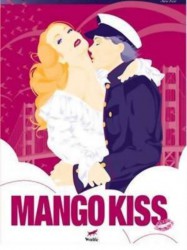
Mango Kiss (2004)
, 1h24Origine Etats-Unis
Genres Comédie romantique, Romance
Thèmes Sexualité, Théâtre, BDSM, Homosexualité, Adaptation d'une pièce de théâtre, LGBT, LGBT, Lesbianisme
Acteurs Michelle Wolff, Sally Kirkland, Max Miller
Rôle Val
Note46%





Lou et Sassafras sont amies et aménagent ensemble à San Francisco. Lou éprouve un profond désir pour Sassafras mais ne s'attend pas à ce que ce soit réciproque...
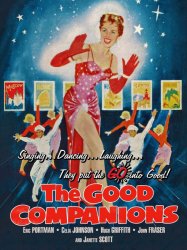
The Good Companions (1957)
, 1h44Réalisé par J. Lee Thompson
Origine Royaume-uni
Genres Comédie, Musical, Romance
Thèmes Musique
Acteurs Eric Portman, Celia Johnson, Max Miller, Hugh Griffith, Janette Scott, John Fraser
Note56%





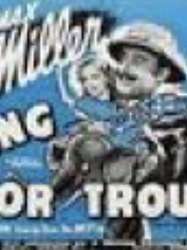
Asking for Trouble (1942)
Origine Royaume-uni
Genres Drame, Comédie
Acteurs Max Miller, Mark Lester, Wilfrid Hyde-White, Aubrey Mallalieu, Kenneth Kove, Esma Cannon
Rôle Dick Smith
Note56%





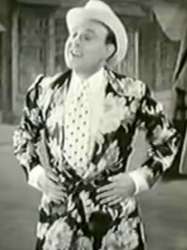
Hoots Mon (1940)
, 1h17Réalisé par Roy William Neill
Origine Royaume-uni
Genres Comédie
Acteurs Max Miller, Florence Desmond, Hal Walters, Davina Craig, Garry Marsh, Gordon McLeod
Rôle Harry Hawkins
Note60%






The Good Old Days (1939)
, 1h19Réalisé par Roy William Neill
Origine Royaume-uni
Acteurs Max Miller, Hal Walters, Martita Hunt, Ian Fleming, Roy Emerton
Rôle Alexander the Greatest

Everything Happens to Me (1938)
, 1h22Réalisé par Roy William Neill
Origine Royaume-uni
Acteurs Chili Bouchier, Max Miller, Frederick Burtwell, Norma Varden, Hal Walters
Rôle Charles Cromwell
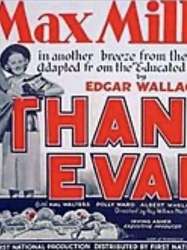
Thank Evans (1938)
, 1h18Réalisé par Roy William Neill
Origine Royaume-uni
Genres Comédie
Thèmes Mise en scène d'un animal, Sport, Les chevaux, Equitation
Acteurs Hal Walters, Max Miller, Aubrey Mallalieu, Harvey Braban, Glen Alyn
Rôle Educated Evans

Don't Get Me Wrong (1937)
, 1h20Réalisé par Reginald Purdell, Arthur B. Woods
Origine Royaume-uni
Genres Comédie
Acteurs George E. Stone, Max Miller, Olive Blakeney, Clifford Heatherley
Rôle Wellington Lincoln
Note59%






Take It from Me (1937)
Réalisé par William Beaudine
Acteurs Max Miller, James Stephenson
Rôle Albert Hall
Note60%





A British boxing promoter tries to get an opportunity for his man to fight for the title in America.

Educated Evans (1936)
, 1h26Réalisé par William Beaudine
Origine Royaume-uni
Genres Comédie
Thèmes Mise en scène d'un animal, Sport, Les chevaux, Equitation
Acteurs Hal Walters, Max Miller, Nancy O'Neil, George Merritt, Frederick Burtwell
Rôle Educated Evans
Cockney racing tipster Evans (Miller) is asked by a nouveau riche and socially aspirant couple to train a racehorse they have bought. The couple know nothing about horse racing, but believe that ownership of a successful racehorse will be their entrée into the high society racing set. Evans does not own a stable, so the horse has to live with him and his two lodgers in an urban mews. He has to keep constantly on his toes, as circumstances continually threaten to reveal to the horse's owners the ramshackle conditions in which the animal is kept.

Get Off My Foot (1935)
, 1h22Réalisé par William Beaudine
Origine Royaume-uni
Genres Comédie
Thèmes Adaptation d'une pièce de théâtre
Acteurs Chili Bouchier, Max Miller, Jane Carr, Norma Varden, Morland Graham, Reginald Purdell
Rôle Herbert Cronk

Things Are Looking Up (1935)
, 1h17Réalisé par Albert de Courville
Origine Royaume-uni
Genres Comédie
Acteurs Cicely Courtneidge, Max Miller, William Gargan, Mary Lawson, Hay Plumb, Vivien Leigh
Rôle Joey
Note60%






Princess Charming (1934)
, 1h18Réalisé par Maurice Elvey
Origine Royaume-uni
Genres Drame, Comédie, Musical, Romance
Thèmes La musique, Musique, Adaptation d'une opérette
Acteurs Evelyn Laye, Henry Wilcoxon, Yvonne Arnaud, Finlay Currie, George Grossmith, Jr., Max Miller
Rôle Walter Chuff aka Sam
Note64%






Vendredi 13 (1933)
, 1h29Réalisé par Victor Saville
Origine Royaume-uni
Genres Drame, Comédie, Horreur
Acteurs Jessie Matthews, Ralph Richardson, Sonnie Hale, Muriel Aked, Cyril Smith, Max Miller
Rôle Joe
Note65%





Le film dépeint la vie de plusieurs passagers dans les heures précédents l'accident de leur autobus.
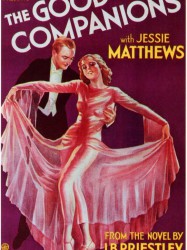
The Good Companions (1933)
, 1h53Réalisé par Victor Saville
Origine Royaume-uni
Genres Comédie, Musical, Romance
Acteurs Jessie Matthews, John Gielgud, Edmund Gwenn, Mary Glynne, Frank Pettingell, Laurence Hanray
Rôle Millbrau
Note68%





A group of widely divergent characters meet up with a broken-down touring concert-party, throw in their lot with them, and eventually triumph after temporary setbacks. This British musical-comedy follows an unlikely trio as they try to revive the fortunes of the floundering theatrical troupe. School teacher Inigo Jolifant (John Gielgud) with his talent for songwriting, and recently unemployed Jess Oakroyd (Edmund Gwenn) with his theatrical ambitions, together persuade Miss Trant (Mary Glynne), an older single woman looking for adventure, to fund them as they attempt to bring "The Dinky Do's" back into the spotlight. Susie Dean (Jessie Matthews) is a chorus girl who dreams of stardom, and when she's made the new leader of the show, it looks as if her dreams may finally come true.
 Connexion
Connexion

